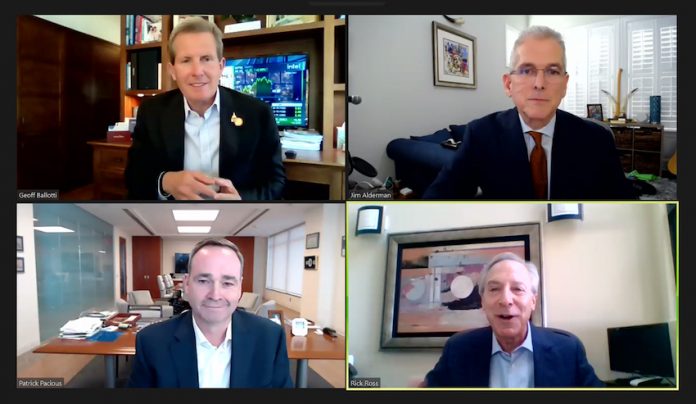
On November 10 during the NYU International Hospitality Industry Investment Conference webinar series, hosted by the NYU SPS Jonathan M. Tisch Center of Hospitality, four executives participated in the virtual “CEOs Think Tank” panel, including Rick Ross, chair, Global Hotels and Leisure, Dentons, who moderated the virtual panel; Geoff Ballotti, president and CEO of Wyndham Hotels & Resorts; Jim Alderman, CEO of Radisson Hotel Group, Americas; and Patrick Pacious, president and CEO of Choice Hotels International. The leaders discussed surviving these unprecedented times, how the pent-up demand for travel will aide recovery, the rise of technology, and more.
Ross kicked off the panel by acknowledging the current challenges industry executives face. “We all know about the spikes going on across the world. Here we are, it’s November 10, [and] each of you and your companies have undergone so many challenges. Right now, it’s just us—we know your companies compete against each other, but we also know this is such a tight-knit community. So, let’s just be candid today. There is no CEO or employee that has gone through these challenges in their whole career.”
On the subject of meetings and events, Alderman said, “This is not the new normal—it’s the current normal. I think with meetings, the number of people that can attend is dependent on what that cash flow looks like. We are having meetings in 10,000-square-foot spaces for 25 people—that is a huge waste of space.”
Ballotti added, “I hope this is not permanent. This is devastating, but meetings are beginning to take place, so I’d start in a position of hope. Meetings are coming back; large groups need to come back. At some point, they will—the question is: ‘When?’ The most important reason is because of the impact it has on our team members.”
Pacious agreed that the demand for meetings is there, particularly in the hospitality industry. “You still have some hesitancy on attending meetings. As a company, we can’t make people go to conferences. But we’re dying to see each other. There’s only so much you can do over Zoom. What I’m concerned about is our younger associates who are still learning the business. How do we get them to understand our industry and build relationships? Those are the kinds of things that happen through small conversations in the hallways. This is an industry, in particular, that thrives on human interaction.”
Alderman commented on the importance of maintaining a positive guest experience despite all of the changes brought on by the pandemic. “Guest experience is paramount. We’ve had to compromise in so many areas because of the pandemic and the one place where we absolutely cannot do that is the experience of our guests. However, some of these temporary adaptions like the hot breakfast instead of a buffet will become permanent.”
On the subject of innovation during the pandemic, Ballotti said, “I’m personally surprised by the technological advancements we’ve seen in the last few months and how quickly consumers can adapt to those. We are requiring additional costs in terms of safety and protocols, and I was expecting more pushback, but only saw rapid adaptation.”
Pacious added that the industry is in a different place now versus earlier this year. “One thing I think is very different today than February is margin of error. We can now afford to take some bold moves and when bad things happen, you can really see who has stepped up.”











